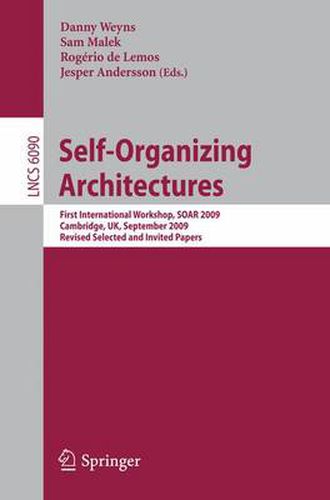Readings Newsletter
Become a Readings Member to make your shopping experience even easier.
Sign in or sign up for free!
You’re not far away from qualifying for FREE standard shipping within Australia
You’ve qualified for FREE standard shipping within Australia
The cart is loading…






Self-adaptability has been proposed as an e?ective approach to automate the complexity associated with the management of modern-day software systems. Self-adaptability endows a software system with the capability to adapt itself at runtime to deal with changing operating conditions or user requirements. Researchersinself-adaptivesystemsmostlytakeanarchitecture-centricfocus on developing top-down solutions. In this approach, the system is monitored to maintain an explicit (architectural) representation of the system and based on a set of (possibly dynamic) goals, the system’s structure or behavior is adapted. Researchersofself-organizingsystemsmostlytakeanalgorithmic/organizational focus on developing bottom-up solutions. In this approach, the system com- nentsadapttheir localbehaviororpatternsofinteractiontochangingconditions and cooperatively realize system adaptation. Self-organizing approaches are - ten inspired by biological or natural phenomena. With the term self-organizing architectures (SOAR) we refer to an engineering approachfor self-adaptive s- tems that combinesarchitecturalapproachesforself-adaptability withprinciples and techniques from self-organization. Whereas both lines of research have been successful at alleviating some of the associated challenges of constructing self-adaptive systems, persistent ch- lenges remain, in particular for building complex distributed self-adaptive s- tems. Among the hard challenges in the architectural-centric approach are h- dling uncertainty and providing decentralized scalable solutions. Some of the hard challenges in the self-organizing approach are connecting local interactions with global system behavior, and accommodating a disciplined engineering - proach. The awarenessgrows that for building complex distributed self-adaptive systems, principles from both self-adaptive systems and self-organizing systems have to be combined.
$9.00 standard shipping within Australia
FREE standard shipping within Australia for orders over $100.00
Express & International shipping calculated at checkout
Self-adaptability has been proposed as an e?ective approach to automate the complexity associated with the management of modern-day software systems. Self-adaptability endows a software system with the capability to adapt itself at runtime to deal with changing operating conditions or user requirements. Researchersinself-adaptivesystemsmostlytakeanarchitecture-centricfocus on developing top-down solutions. In this approach, the system is monitored to maintain an explicit (architectural) representation of the system and based on a set of (possibly dynamic) goals, the system’s structure or behavior is adapted. Researchersofself-organizingsystemsmostlytakeanalgorithmic/organizational focus on developing bottom-up solutions. In this approach, the system com- nentsadapttheir localbehaviororpatternsofinteractiontochangingconditions and cooperatively realize system adaptation. Self-organizing approaches are - ten inspired by biological or natural phenomena. With the term self-organizing architectures (SOAR) we refer to an engineering approachfor self-adaptive s- tems that combinesarchitecturalapproachesforself-adaptability withprinciples and techniques from self-organization. Whereas both lines of research have been successful at alleviating some of the associated challenges of constructing self-adaptive systems, persistent ch- lenges remain, in particular for building complex distributed self-adaptive s- tems. Among the hard challenges in the architectural-centric approach are h- dling uncertainty and providing decentralized scalable solutions. Some of the hard challenges in the self-organizing approach are connecting local interactions with global system behavior, and accommodating a disciplined engineering - proach. The awarenessgrows that for building complex distributed self-adaptive systems, principles from both self-adaptive systems and self-organizing systems have to be combined.